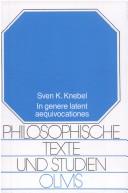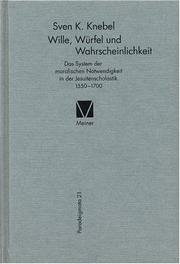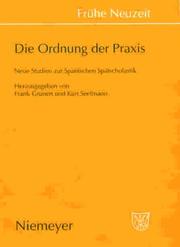| Listing 1 - 10 of 12 | << page >> |
Sort by
|

ISBN: 3487091534 9783487091532 Year: 1989 Volume: 20 Publisher: Hildesheim Olms
Abstract | Keywords | Export | Availability | Bookmark
 Loading...
Loading...Choose an application
- Reference Manager
- EndNote
- RefWorks (Direct export to RefWorks)
Semantics (Philosophy) --- Universals (Philosophy) --- Philosophy, Ancient --- Philosophy, Medieval --- Sémantique (Philosophie) --- Universaux --- Philosophie ancienne --- Philosophie médiévale --- History --- Histoire --- Philosophy, Greek. --- Philosophy. Medieval. --- History. --- Philosophy, Greek --- Philosophy. Medieval --- -Intension (Philosophy) --- Logical semantics --- Semantics (Logic) --- Semeiotics --- Significs --- Syntactics --- Unified science --- Language and languages --- Logic, Symbolic and mathematical --- Logical positivism --- Meaning (Psychology) --- Philosophy, Modern --- Semiotics --- Signs and symbols --- Symbolism --- Analysis (Philosophy) --- Definition (Philosophy) --- Medieval philosophy --- Scholasticism --- Ancient philosophy --- Greek philosophy --- Philosophy, Roman --- Roman philosophy --- -History --- Sémantique (Philosophie) --- Philosophie médiévale --- Intension (Philosophy) --- Semantics (Philosophy) - History.

ISBN: 3787315284 9783787315284 Year: 2000 Volume: 21 Publisher: Hamburg Meiner
Abstract | Keywords | Export | Availability | Bookmark
 Loading...
Loading...Choose an application
- Reference Manager
- EndNote
- RefWorks (Direct export to RefWorks)
Die Mathematisierung der Wahrscheinlichkeit ist eine Leistung erst der frühen Neuzeit. Deswegen ist aber der mathematisierbare Begriff der Wahrscheinlichkeit im 17. Jahrhundert nicht aus dem Nichts entstanden. Er ist das Produkt der Theologie in der Epoche der Gnadenstreitigkeiten. Ohne die Einbeziehung der sowohl philosophiegeschichtlichen als auch neuzeitgenealogisch bisher regelmäßig verdrängten Jesuitenscholastik bleibt einer der in der heutigen Wissenschaftsgeschichte meistdiskutierten Vorgänge unerklärlich. Diese Interdisziplinär angelegte Untersuchung lenkt den Blick auf das Spanien des Goldenen Zeitalters. Sie wendet sich an Mediävisten, Theologie-, Philosophie- und Wissenschaftshistoriker.
Necessity (Philosophy) --- Probabilities --- History --- Causation --- Chance --- Fate and fatalism --- Ontology --- Teleology --- Truth --- Necessity (Philosophy) - History --- Probabilities - History
Book
ISBN: 9789027260079 Year: 2021 Publisher: Amsterdam/Philadelphia John Benjamins
Abstract | Keywords | Export | Availability | Bookmark
 Loading...
Loading...Choose an application
- Reference Manager
- EndNote
- RefWorks (Direct export to RefWorks)
"Molinism, formerly an invective, is nowadays a topic of philosophy. This book, however, does not deal with the modern renaissance of Middle Knowledge, rather, it explores its proliferation during the 17th and 18th centuries. The focus shifts from reviewing current trends in Church History to rehearsing the metaphysics that backed up Middle Knowledge. Fact, in Molinism, is threefold: It could have been otherwise, it belongs to some possible world, it is necessarily known by the Omniscient. Whereas the classical account of God's foreknowledge rests on its being postvolitional, the Molinist qualification of this account denies that it applies to the counterfactuals. On what else then does it prevolitionally depend that God knows for sure something to happen rather than not to happen? The Salmantine Treatise on God's foreknowledge edited here provides some additional piece of evidence of a deep Molinist disagreement. Though the manuscript was ready for print in 1653, this business failed and the manuscript fell into oblivion along with its author. The Jesuit Luke Wadding (1593-1651) belongs to a number of men from Waterford who at a time, when intolerance forced Catholics into large scale emigration, hopefully turned towards Spain. He must not be confounded with his famous namesake, the Franciscan friar, who was his cousin"--
God --- Free will and determinism. --- Molinism. --- Contingency (Philosophy) --- Omniscience. --- Wadding, Luke, --- Biblioteca Universitaria de Salamanca. --- Philosophy --- Free will and determinism --- Grace (Theology) --- Compatibilism --- Determinism and free will --- Determinism and indeterminism --- Free agency --- Freedom and determinism --- Freedom of the will --- Indeterminism --- Liberty of the will --- Determinism (Philosophy) --- Knowledge of God (Omniscience of God) --- Omniscience (Theory of knowledge) --- Religious aspects --- Catholic Church --- Knowledge (Omniscience) --- Attributes
Book
ISBN: 3846769169 Year: 2024 Publisher: Boston : BRILL,
Abstract | Keywords | Export | Availability | Bookmark
 Loading...
Loading...Choose an application
- Reference Manager
- EndNote
- RefWorks (Direct export to RefWorks)
Book
ISBN: 9027208492 9027208506 9027208514 9027208522 9789027208521 9027260095 9027260079 9027260060 9027260087 9789027208514 9789027208507 9789027208491 Year: 2021 Volume: 321 Publisher: Amsterdam Benjamins
Abstract | Keywords | Export | Availability | Bookmark
 Loading...
Loading...Choose an application
- Reference Manager
- EndNote
- RefWorks (Direct export to RefWorks)
Emotion as an emergent theme in conversation analysis : preface / Anssi Peräkylä -- How emotions are made to do things : an introduction / Ann Weatherall and Jessica S. Robles -- The social moral ordering of emotions -- Emotional intensity as a resource for moral assessments : the action of 'incitement' in sports settings -- Edward Reynolds -- Affect in interaction : working out expectancies and responsibility in a phone call / Bryanna Hebenstreit and Alan Zemel -- Displaying emotional control by how crying and talking are managed / Ann Weatherall -- Emotions as temporally unfolding -- Using objects and technologies in the immediate environment as resources for managing affect displays in troubles talk / Jessica S. Robles, Stephen M. Didomenico and Joshua Raclaw -- Shared affective stance displays as preliminary to complaining -- Johanna Ruusuvuori, Birte Asmuss, Pentti Henttonen and Niklas Ravaja -- Embodiment in reciprocal laughter : sharing laughter, gaze, and embodied stance in children's peer group / Emilia Strid and Asta Cekaite -- Displays of emotion -- Responding empathically from shifting epistemic terrains / Joseph Ford and Alexa Hepburn -- Socializing the emotions of joy and surprise in parent-child interaction / Hansun Zhang Waring -- Haptics and emotions in speech and language therapy sessions for people with post-stroke aphasia / Sara Merlino -- Affect and accountability : pain displays as a resource for action / Amanda Mcarthur -- Transcription glossary. "How Emotions are Made in Talk brings together an exciting collection of cutting-edge interactional research examining emotions and affectivity as social actions. The international selection of scholars draw on ethnomethodology and conversation analysis applied to a range of settings including sports, workplaces, telephone calls, classrooms, friends and healthcare. The aim of the book is to provide new insights into how emotions are produced as social actions in relation to, for example, encouragement, responsibility, crying, objects, empathy, joy, surprise, touch, and pain. This volume should be of interest to interactional scholars and researchers interested in social approaches to emotion, and addresses a range of scholarship across the disciplines of sociology, communication, psychology, linguistics, and anthropology"
Emotions --- Feelings --- Human emotions --- Passions --- Psychology --- Affect (Psychology) --- Affective neuroscience --- Apathy --- Pathognomy --- Emotions. --- English language - Verb --- English language - Syntax --- English language - Variation --- Construction grammar --- Corpora (Linguistics) --- English language
Book
ISBN: 9789060323847 9789027287212 902728721X 906032384X 9786613059420 6613059420 1283059428 9781283059428 Year: 2011 Volume: 51 Publisher: Amsterdam Philadelphia B.R. Grüner
Abstract | Keywords | Export | Availability | Bookmark
 Loading...
Loading...Choose an application
- Reference Manager
- EndNote
- RefWorks (Direct export to RefWorks)
Geistesgeschichtlich ist die große Vergangenheit des lateinischen Aristotelismus immer noch unbewältigt. Die vorliegende Teiledition eines Cursus philosophicus von 1653/55 [Ms. BU Salamanca 1351-52] dokumentiert den regen Schulbetrieb zu Lockes Zeit. Etwas ‚metaphysische' zu betrachten, das hieß im Suarezismus, es gerade unter Bezug auf unser Denken zu betrachten: quoad nostros conceptus (Arriaga). In diesem erkenntnistheoretischen Sinn ‚metaphysische' Abhandlungen sind hier zusammengestellt. Hauptfrage: Hat das Urteil schon diesseits des Wahrheitsbezugs einen eigenen Gegenstandsbezug? Die Psychologie des Urteils erscheint systematisch verknüpft mit der Ontologie des Irrealen (ens rationis ratiocinantis). Der Autor González de Santalla, sonst immer nur der Märtyrer der Gesinnungsethik, wird als Scholastiker vorgestellt. Die intellektuelle Biographie dieses Jesuiten konzentriert sich auf seine philosophiepolitische Aktivität: Ab 1687 war er der Chef jenes globalen Bildungskonzerns, der damals über sechshundert Schulen und Hochschulen unterhielt. Hundert Jahre später war diese Institution, die Societas Jesu, vom Erdboden verschwunden.Interessenten: Philosophen, Mediävisten, Romanisten, Theologen, KulturhistorikerÜber den Autor: Sven K. Knebel, Jg. 1958, ist Privatdozent für Philosophie an der Freien Universität Berlin. Bücher: In genere latent aequivocationes. Zur Tradition der Universalienkritik aus dem Geist der Dihärese, Hildesheim 1989; Wille, Würfel und Wahrscheinlichkeit. Das System der moralischen Notwendigkeit in der Jesuitenscholastik (1550-1700), Hamburg 2000.In order to trace Psychologism, particularly the 18th-century‚ perception theory of judgment' (G. Nuchelmans), a case is made for a fair appreciation of the Aristotelian school philosophy during Locke's life time. From a hitherto unknown Jesuit Cursus Philosophicus of 1653/55, a substantial portion of its disputations on Logic, Psychology and Metaphysics is edited. A remarkable refutation of Suárez's classical account of the beings of reason reveals the systematic connection between any theory of judgment and the ideas on how to make sense of the chimaeras. This time, González de Santalla, otherwise famous for his firm stand against ethical Probabilism, is presented as an epistemologist. His intellectual biography focuses on the schoolman and on a future Jesuit General's (1687-1703) educational policy, who tried to keep the standards of school philosophy.Readers: Scholars interested in mediaeval and modern philosophy, in the history of higher education, and hispanists.
Cognition. --- Metaphysics. --- Philosophy. --- Suárez, Francisco, --- Cognition --- Metaphysics --- Philosophy --- Mental philosophy --- Humanities --- God --- Ontology --- Philosophy of mind --- Psychology --- Suárez, Francisco, --- Doctor Eximio, --- Eximio, --- Soarez, Francisco, --- Soarius, Franciscus, --- Suárez de Toledo Vázquez de Utiel y González de la Torre, Francisco, --- Suárez, Francis, --- Suárez, Franciscus, --- Suarez, Franciszek, --- Suárez, François, --- Suarez, Franz, --- Suarius, Franciscus, --- Svarius, Franciscus, --- Suárez, Francisco, - 1548-1617
Digital

ISBN: 9783110214765 9783110214758 Year: 2009 Publisher: Berlin ;; Boston De Gruyter
Abstract | Keywords | Export | Availability | Bookmark
 Loading...
Loading...Choose an application
- Reference Manager
- EndNote
- RefWorks (Direct export to RefWorks)
Digital

ISBN: 9783484970748 9783484366244 Year: 2009 Publisher: Tübingen Max Niemeyer Verlag
Abstract | Keywords | Export | Availability | Bookmark
 Loading...
Loading...Choose an application
- Reference Manager
- EndNote
- RefWorks (Direct export to RefWorks)


ISBN: 9783110935288 9783484365681 Year: 2011 Publisher: Berlin ;; Boston De Gruyter
Abstract | Keywords | Export | Availability | Bookmark
 Loading...
Loading...Choose an application
- Reference Manager
- EndNote
- RefWorks (Direct export to RefWorks)
Digital

ISBN: 9783110212204 9783110203097 Year: 2008 Publisher: Berlin ;; Boston De Gruyter
Abstract | Keywords | Export | Availability | Bookmark
 Loading...
Loading...Choose an application
- Reference Manager
- EndNote
- RefWorks (Direct export to RefWorks)
| Listing 1 - 10 of 12 | << page >> |
Sort by
|

 Search
Search Feedback
Feedback About UniCat
About UniCat  Help
Help News
News